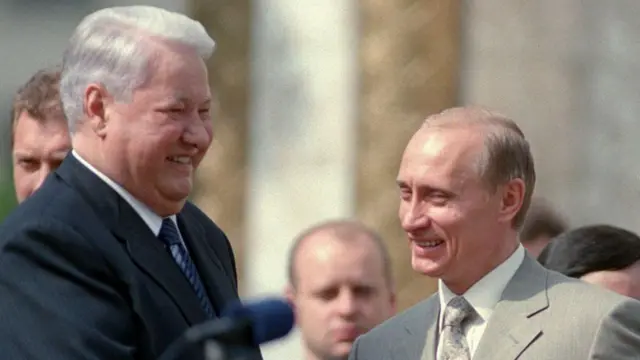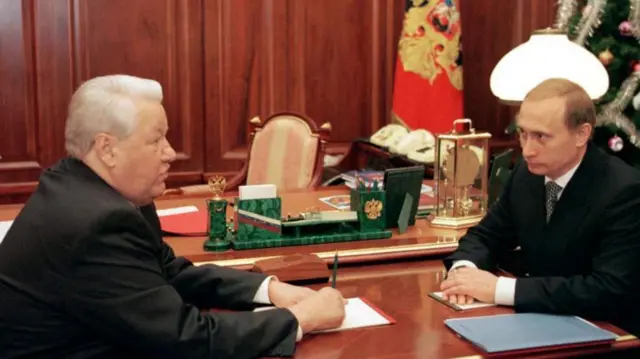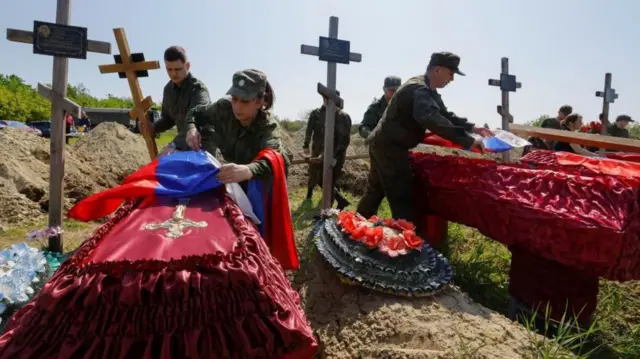25 years of Putin in power: Did he keep his promise to Yeltsin to "take good care of Russia"?

- Steve Rosenberg
- BBC Russia correspondent
- Reporting fromMoscow
I will never forget New Year's Eve 1999.
I was working as a producer in the BBC's Moscow office when the news broke: Russian President Boris Yeltsin had resigned.
The news came as a shock to everyone, including the British press corps in Moscow. But no one was in the office on New Year's Eve. So when the news broke, I had to write and broadcast my first report for the BBC.
"Yeltsin always said he would serve out his term, but today he told the Russians he had changed his mind," my report said.
This was the beginning of my career as a journalist and the beginning of Putin’s career as the leader of Russia.
Because, according to the Russian Constitution, after Yeltsin resigned, Putin, then Prime Minister, became acting president. Three months later, he won the election. When leaving the Kremlin, Yeltsin's parting words to Putin were: "Take good care of Russia!"
As Russia’s war in Ukraine approaches its third year, I think back to Yeltsin’s words more and more.
This is because Putin’s full-scale invasion of Ukraine has had devastating consequences.
First, Ukraine, whose cities suffered massive destruction and casualties. Nearly 20% of its territory was occupied and 10 million citizens were forced to flee their homes. But Russia was also hit hard.
I have been covering Putin since he came to power 25 years ago.
Who would have thought on December 31, 1999, that Russia's new leaders would still be in power a quarter of a century later? Or that today's Russia would be waging war against Ukraine and confronting the West?
Since Putin launched the so-called "special military operation" in 2022, Russia has suffered heavy losses on the battlefield. I often wonder if Yeltsin had chosen someone else to take over, would the course of history be fundamentally different? Of course, this question is purely academic. History is full of assumptions and possibilities.
But I can say with certainty that I have seen different Putin over the past 25 years. And I am not the only one who feels this way.

“The Putin I met, with whom I made a good deal to set up the NATO-Russia Council, is very, very different to the megalomaniacal Putin of today,” Lord Robertson, a former NATO chief, told me last year.
"The man who stood beside me in May 2002 saying Ukraine was a sovereign, independent state that would make decisions about its own security is now saying Ukraine is not a state," Lord Robertson added.
"I think Putin has a very fragile ego and very strong ambitions for his country. The Soviet Union was considered the world's second superpower. Russia can no longer make that claim, and I think that has eroded his sense of who he is."
This may explain the change we have witnessed in Putin over the years: his desire to “make Russia great again” (and to make up for what many citizens feel is Moscow’s failure in the Cold War) has put Russia on an inevitable path of confrontation with its neighbors and the West.
The Kremlin, however, has a different explanation.
In his speeches and comments, Putin appears to be driven by resentment that Russia has been lied to and belittled for years and that its security concerns have been ignored by the West.

But does Putin himself believe that he has fulfilled Yeltsin's request to "take good care of Russia"?
I recently had the opportunity to learn this.
During that four-hour year-end press conference, Putin asked me to ask questions.
“Yeltsin wants you to take care of Russia,” I reminded him.https://gillspaste.com/sstvsu6tg?key=3c6a2f0c348249bd18222793323d13fd
“But with the heavy losses in your so-called special military operations, the occupation of Ukrainian forces in the Kursk region, foreign sanctions, and high inflation, do you think you are really taking care of your country?”
"Yes!" Putin replied.
"And I'm not just taking care of it. We in Russia have pulled back from the brink of the abyss."
He described Russia during Yeltsin's era as a country that had lost its sovereignty, accusing the West of condescendingly "patting Yeltsin on the shoulder" while "using Russia" to pursue its own interests.
Putin believes he is "doing everything he can" to ensure that Russia is an independent, sovereign state.
Putin presents himself as a defender of Russian sovereignty: is this a view he has concocted to try to justify his aggression against Ukraine or does he really believe in this view of modern Russian history?
I’m still not sure. Not yet, at least. But I feel like this is a critical question. And the answer to it could affect the outcome of the war, and Russia’s future.
Comments
Post a Comment